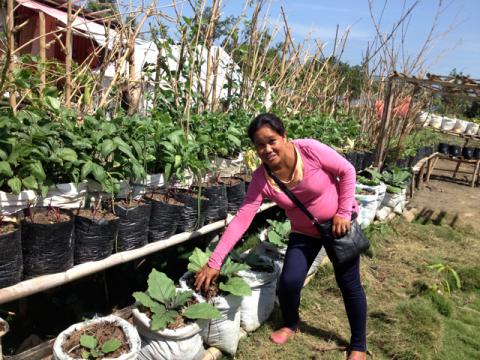Gardens provide food security after Haiyan

By Cecil Laguardia, Communications Manager, Typhoon Haiyan Response
They are not your ordinary gardens. They are gardens borne from the need to rise from adversity. After Haiyan hit the island of Panay, the greening of this community followed.
Vegetables grown out of a sheared basketball, an old latrine, a halved truck tire and a damaged refrigerator. A sight for sore eyes as herbs popped through torn women’s bags. In this small village of Daculan, Estancia town in Ilo-ilo province, recycling has taken an interesting turn. They call it creative gardening and indeed, it is!
Maribeth, 45, the women’s group leader, said when World Vision introduced the project three years back, not many – except for 30 women –took it seriously. After all, the sea is wide and people look up at fishing as a main income earner and food provider for families.
When Haiyan hit last year and damaged all the fishing boats, everyone became frantic. Food was scarce, fish were even scarcer. World Vision came to distribute food and other emergency essentials but Antonio said the people were realistic.
“We know the relief goods cannot last forever. We have to find our own solutions on food security and help ourselves”, she says.
The idea came to her like a light bulb. “Of course, our creative gardens were our number one solution. We do not have money to buy food in the market and everything was expensive for lack of supply. We realized we can grow our own food and right in our backyards”, she adds beaming.
Together with another gardening advocate 45-year old Annabelle Munez, Maribeth campaigned around her village and encouraged everyone to grow vegetables. She said when people have few choices, they find better solutions.
“It took the fishermen to go to sea after being traumatized by Haiyan. All of us were also scared of eating fish because of the dead bodies washed onto our shores. Without other options, people started planting vegetables”, she says.
The campaign took off without much prodding. Fishermen who were once squeamish helping their wives dig the soil got busy and eventually enjoyed planting. Maribeth said it was inspiring to see the entire community outdo each other in cultivating their gardens and finding old materials to turn into plant boxes.
Of course, our creative gardens were our number one solution.
The activity helped people get over their traumatic experience while at the same time ensuring healthy food on their tables. Maribeth says, “You can only eat so much canned goods from the relief supplies. We also know that relying on them was not good for our children’s health. The program we learned became a handy solution. It was also something everyone can do.”
Vegetable seeds were provided by World Vision as villagers in Daculan rose to the challenge of leading their own recovery. A single mother with three children whose eldest daughter graduates in high school this year, Maribeth was touched by the positive turn of events that opened the eyes of her neighbors about resilience and initiative.
She commends Annabelle as the most creative among the women showing the thriving vegetables. From 30 women, the number of gardeners has now increased to over a hundred families, practically everyone in the village.
Their harrowing encounter of Haiyan is now gradually fading as the greening gardens fill the village with hope. “We still need more support as we rise up from our knees on this unexpected disaster. We continue to struggle with the damage it has caused to everyone. But it is good to use what we have learned before and put it to work”, Annabelle adds.
Both women said they share their harvest to neighbors and even acquaintances in neighboring villages. Maribeth says, “We hardly sell the excess. Sometimes we do when we have the chance to go to the town market. But we prioritize giving them to others in need so we can help in our own small way.”
This humble community in Ilo-ilo is teaching everyone that with hard work and resourcefulness, recovery from even the strongest disaster in the world is possible.
Creative gardening program is part of World Vision’s livelihood program and aims to educate at least 12,000 families in its response area. Livelihoods manager Patricio Agustin says, “Gardening is one of the most effective ways to recover food security after a disaster. The markets are disrupted and the resources are readily available in the community.”
